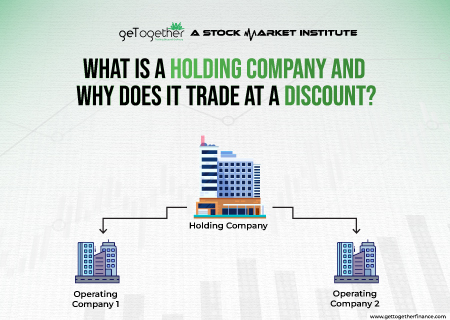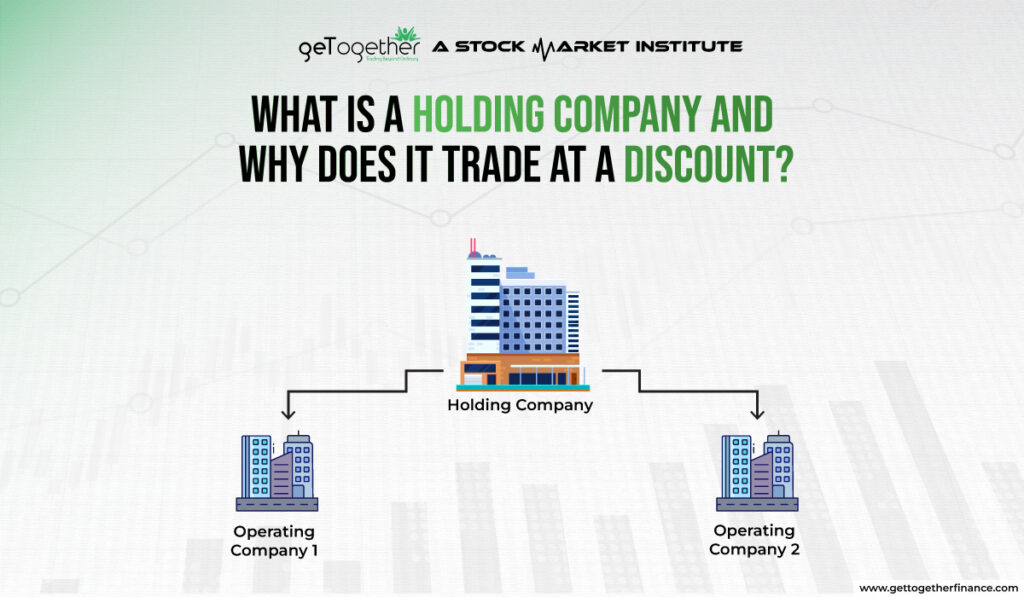What is a Holding Company and why does it trade at a discount?


Have you stumbled upon a company that doesn’t really manufacture products, offer services, or do any mainstream business at all? Wondering yourself, the concept can quite create a dilemma on what business they have.
Well, such a company is generally known as a holding company. This is a unique structure that doesn’t manufacture any mainstream commodities but manages a group of other businesses, called subsidiaries. But what surprises investors even more is holding discounts where they trade for securities for less than the value of the business they actually own.
Exciting! But before getting to that concept, let’s explore its basic concept and understand how it trades at a discount.
Without any further ado, let’s begin.
What is a holding company?

A holding company is a type of parent company that doesn’t engage in selling services or products. Instead, their primary function is to own or manage a big chunk of other companies, also called subsidiaries. Such companies are often listed under a corporate or limited liability company (LLC) that may operate in a diverse range of industries without geographically restraining themselves.
For instance, imagine a group of people who go Dutch to buy various waffle machines across the town. Now, the friends aren’t directly engaging themselves in having a cafe or serving a waffle but own and manage the operations of the companies that use those waffles (subsidiaries)
While the company keeps an oversight on the overall operations of a holding business, it may not participate in day-to-day operations. Such large companies are also termed as “umbrellas” in the business world.
Understanding Holding Companies
Unlike most companies that are valued based on their future earnings, the functions of holding companies work a little differently. Since their main business is not exchanging goods or services for money, they earn value mostly through dividends paid by the subsidiaries companies they own.
The term was first coined as a common form of business around 1900. The key purpose of this structure is to reap the benefits and take authority over the other companies. Its businesses may vary from owning property, trademarks, patents, real estate, stocks, and other assets. Businesses with complete ownership of a holding company are also known as “wholly owned subsidiaries”.
Holding companies operate in simpler and less expensive ways while gaining more control over other businesses in comparison to consolidation and mergers. The structure also aids in legal and financial liabilities if a subsidiary company gets sued or faces some financial issues, the holding companies remain protected. It may also help them with lowering tax rates by strategically placing their subsidiaries in countries with lower tax rates.
Valuing a Holding Company: Income vs. Assets

To understand its functioning and structure, there are typically two ways to explain the valuing of holding companies.
Value Based on Income: Since there is no direct business owned by a holding company, looking at its direct income in comparison to its subsidiaries would not make sense. Hence, an assessment of its business or income may not paint a whole picture of its actual worth.
Value-Based on Asset: The assets are like the missing pieces of puzzles that would assemble the complete value altogether. The real value of a holding company lies in what assets it owns and its investment in other organisations. Henceforth, the best way to figure out the actual worth of a holding company is to evaluate the balance of all the businesses (subsidiaries) it owns.
Simply put, the essence lies in the companies it controls, so if you want to know how much a holding company is worth, go for the businesses it owns.
Why Does A Holding Company Trade At A Discount?

Now that we understand that the true value of a holding company is the income of its subsidiaries, rather than its own income. But there is another factor of discount that puzzles most investors. Sometimes a holding company trades a stock at a lower price than its price available on the stock market listed by businesses. Why does this happen? Here are listed three major reasons why holding companies offer discounts:
- Liquidation Discount: Even though we value a holding company based on its subsidiaries, a straight-up addition might not be accurate. Imagine the holding company needs to sell its subsidiaries (liquidate). It might have to pay taxes on any capital gains earned by the subsidiaries. This potential tax burden can lead to a discount on the overall value of the holding company.
- Discount for Lack of Control: Now let’s take examples of two scenarios:
- Scenario 1: A holding company completely owns a subsidiary (100% stake). This gives them full control over the subsidiary’s operations and decisions.
- Scenario 2: Another holding company owns a smaller stake in a different company (maybe 20%).
In scenario 1, the holding company has more control and influence, making its ownership stake more valuable. In scenario 2, the holding company has less control, so its stake might be valued at a discount compared to scenario 1.
- Discount for Lack of Marketability: Remember, the subsidiaries are separate legal entities from the holding company. This can make it more difficult and time-consuming to sell the subsidiaries’ assets compared to selling shares in a single, publicly traded company. This lack of marketability can also lead to a discount on the holding company’s stock price.
The type and amount of discounts may vary, but it is not uncommon for investors to observe holding companies buy or sell at 40-60% lower than their net asset value (NAV). But, there is no specific number of discounts as those are based on multiple factors such as future prospects, dividend payouts, and the types of investment it holds.
Real-World Example of Holding Company Discount

In order to completely understand a concept, it’s best to use an example. For instance, Berkshire Hathaway is a well-known holding company run by Warren Buffett. The company has multiple subsidiaries, from battery makers like Duracell to insurance firms like Geico. The individual companies owned by Berkshire Hathaway might be strong and valuable, but the holding company itself might trade at a discount due to the reasons mentioned above. Investors might be willing to pay a premium for direct ownership of Duracell or Geico to have more control and avoid the holding company discount.
In A Nutshell
Understanding the basic intricacies of a holding company can be intricate but to ace the concept, you need to equip yourself with structure and the reasons behind potential discount. Holding companies sometimes provide trade at a discounted price, relative to the true value of business in the market. The discount can be due to several factors such as lack of control over subsidies, minimising potential tax burdens during liquidation, and the difficulty of selling subsidiary assets compared to a single organisation’s shares.
FAQs
What is a holding company?
A holding company is a parent organisation that doesn’t sell services or products but owns and manages other companies. It’s like a giant piggy bank for businesses, also known as subsidiaries. Mostly the significant income they earn is from dividends.
What is the purpose of a holding company?
Holding companies hold the ownership of multiple businesses. The purpose is to create a simple yet effective system to control businesses and manage operations without going for complex processes such as mergers or acquisitions. This also helps companies to earn funds without risking their assets, saves taxes, and offers flexibility while owning significant business accounts.
What is a personal holding company (PHC)?
A PHC or personal holding company is a special type of holding enterprise, often family-owned. Such structures often get most of their income from passive sources such as dividends. There can be tax implications for PHCs, so it is highly recommended to use a tax advisor.
What is a holding and subsidiary company?
A holding company, generally is a parent company whose main purpose is to own and control other companies such as subsidiaries. On the flip side, a subsidiary company is a type of business i.e. majority-owned by another parent holding company (usually more than 50% of the shares). Such a business functions somewhat independently, but the holding company owns major control over its decisions.








